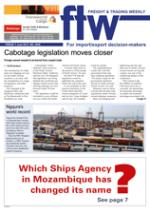The clearing and forwarding
industry is rapidly losing
staff skilled in project and
abnormal cargo, and this
frequently creates chaos in
the supply chain, according
to Carl Webb, MD of Project
Logistics Management and
a member of the abnormal
loads committee of the Road
Freight Association (RFA).
“What I’m finding, and
it’s very worrying for the
transport industry, is that
this type of experience is
fast disappearing from the
c&f sector, and nothing is
being done to replace it. No
apprenticeships being taken
– nothing.
“The new staff members
are trained in containers or
breakbulk cargo clearing
and forwarding, but not in
abnormal loads, so we’ve
ended up with them having a
very blinkered approach.
“We’re seeing project
cargo going through these
c&f controllers, and it’s a
complete fiasco.”
A recent example,
according to Webb, was
an abnormal unit on a flatrack.
It was too heavy to
be unloaded at the Durban
container terminal (DCT).
So it had to be moved across
to the Point by the floating
crane, where it was unloaded
and dumped directly onto
the wharfside. A mobile
crane then had to be hired to
load the unit onto a trailer,
and the flat rack returned.
“It was impossible to
get the c&f controller to
understand that it was
now two pieces of cargo,
and needed two sets
of documents,” he told
FTW. “But Transnet Port
Terminals (TPT) was not
happy with this mess-up, so
it demanded that we move it
breakbulk – and that’s much
more costly.”
Unfortunately, Webb
added, this type of thing
is becoming common.
Anything that is out of
normal is more difficult to
manage because of this lack
of understanding.
“It’s paper people who
are coming through in the
c&f industry, not practically
experienced people. And it’s
scary, as the mess-ups that
this creates lead to the port
authorities introducing more
rules – which just makes
things more of a problem
for us.
“There’s a lack of
experience, and it’s not
being addressed. We’re
losing out on knowledge of
what’s possible, and how to
achieve it. A disaster scene
for the abnormal transport
industry.”
INSERT
‘It’s paper people who
are coming through
in the c&f industry,
not practically
experienced people.’

